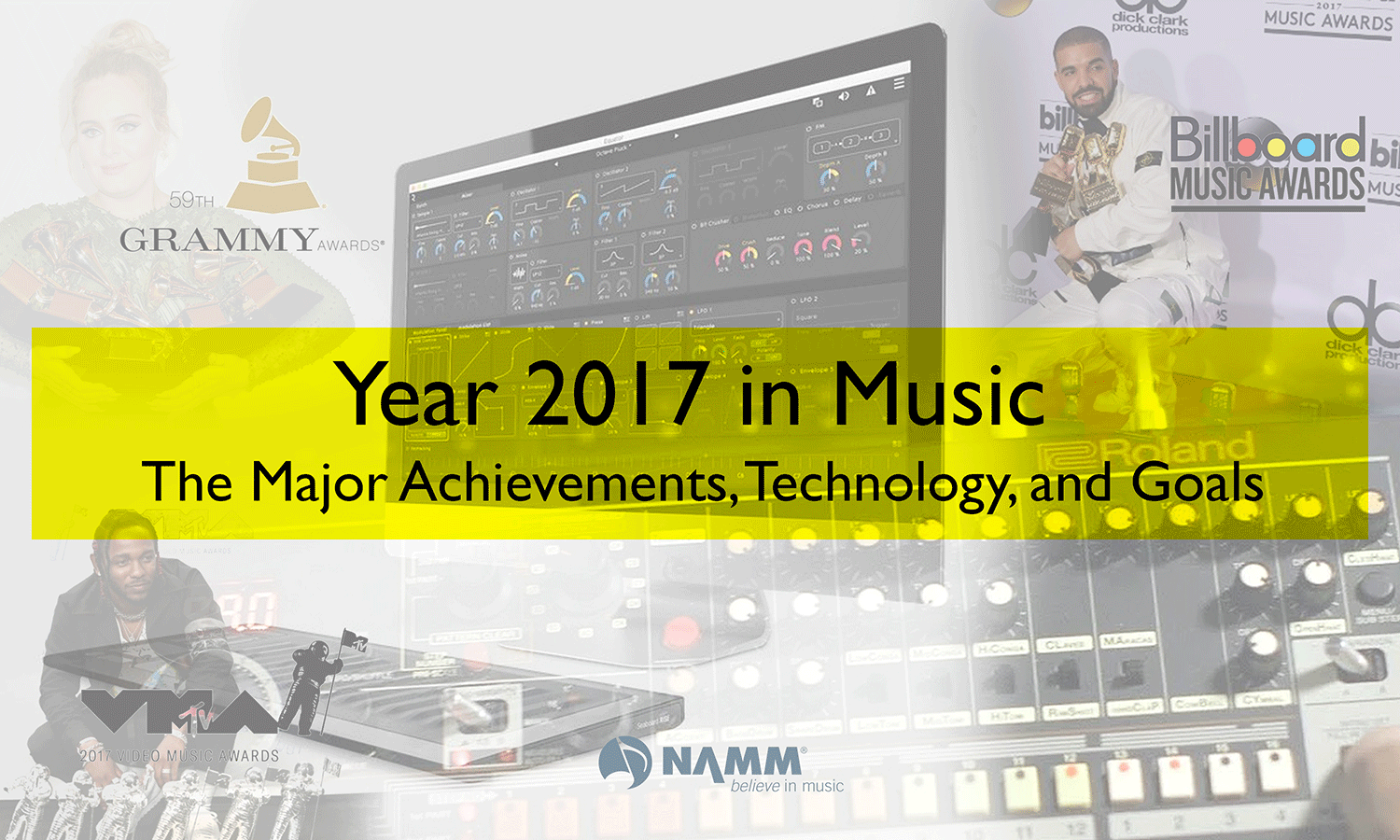
Year 2017 in Music: The Major Achievements, Technology, and Goals
I wanted to talk about some of the major achievements in the music industry. From technological advancements, incredible achievements by the well-known and previously unknown, and goals looking forward. Music is a growing and transforming art that has always had a large stake in forming the cultures of the world, and this is an attempt to summarize this year in music.
Mobile Technology
The crazy upsurge of technology being produced for computer music has been twisting slightly toward mobile and tablet.
With IK Multimedia's iRig, Roli's Light Blocks, Izotope Spire Studio, and many more hardware tools. We see a bright future in the music industry as more and more people are able to create relatively high-quality levels of music with these tools. I think there will be many music tech developments this coming year in mobile technology.



Older Technology Refreshed
Moog and Roland, as well as many other music hardware companies have found their timeless gear to be sampled. These samples are often inspirations for them to make their own modeled plugins or revamp old classics. Roland revamped the TR-808, which is probably the most used drum machine device in history. Here we come $$$ Roland. Moog brought back the Minimoog Model D

Unfortuately for Moog, Behringer created a modeled version of the minimoog in eurorack form. This is only $299 vs over $3k each. Sorry, Moog. (Moog does sound better if it helps)


Older Formats and Recreation
People today are now beginning to crave the physicality that CD's, Tapes, and Records used to bring. With fewer record pressing plants in the USA than nearly ever, it's getting more and more expensive to press a record. The rebirth of the cassette tape. It will be competing with the vinyl sales in years to come. Albeit, cassettes are way less cool than spinning a record... but it's a step toward that analog sound again.
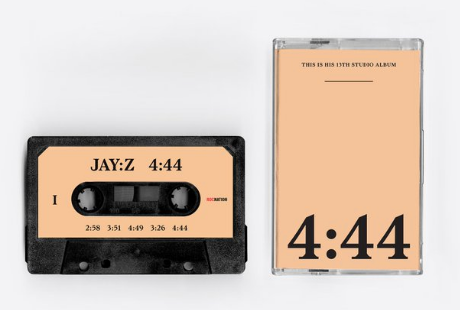
Concert Advancements
New advancement in concert technology this year as we find there are more cashless events popping up. Yes, wristbands have been used this year to help prevent ticket fraud, RFID is the central hub of that technology. Some have added mobile ways to pay with their wristbands so that you don't need a payment method, just a swipe of a wristband! Hows that for disconnecting your money from your thoughts even more?

Cross-Integration Services for Apps
Several apps such as Waze and Spotify or Apple Music and Ticketmaster have cross-integrated so that it's easy to access both services as one integrated unit.

Augmented Reality, Virtual Reality, 360 Video, and AI in Music
I briefly talked about AI music in a previous post. Virtual Reality, Augmented Reality, and 360 Video seem to be taking over as well. The Deep Mind 12 by Behringer is an interface for augmented reality and music making. What's exciting about this is that it's a step into bringing augmented reality into our music studios. I think this is a much needed technology for all of our every day lives, but for this in particular for me... it's really exciting. Thanks for killin it again Behringer.
A System That Can Predict Virality
I think yes. Musx has done it through data mining. It puts together data of artists from plays, to saves, downloads, likes, comments, shares, reshares, and it can track upcoming artists success to predict the next big artists.
Pandora also acquired The Next Big Sound system that does something similar but with 10 years of work into it. It's built to predict who might hit Billboard charts. Then these artists are leveraged with major brands to help then find the next big artist to help promote their products (Pepsi and Coca Cola).
TEC Awards and NAMM
NAMM 2017 had selected Jack Douglass as their 2017 Inductee for TEC Awards. Associated with Aerosmith and many of their most popular records, Jack Douglass has been dubbed the sixth member of the group (joking but should be) and is instrumental in their multi-platinum success.

"Four companies – AVID, iZotope, Sennheiser and Solid State Logic – scored several Outstanding Technical Achievement awards, each taking home two statues each. AVID’s Pro Tools Dock and Pro Tools 12.3 picked up in Workstation Technology and Audio Apps & Hardware categories; iZotope in a new designation: Audio Education Technology, for the company’s Pro Audio Essentials and the Ozone 7 Advanced in the category of Signal Processing Software; Sennheiser in Wireless and Headphone/Earpiece Technology categories for the Wireless G3 A-1 Band and the HD 25 Plus and finally Solid State Logic for Large and Small Console Technology categories for the System T and the Sigma Delta. Outstanding Technical Achievement honors were chosen in 23 categories." Source
The Recording Academy Advocacy 2017 Achievements
Bipartisan support for 4 pro-music bills. Many sponsors were accrued for the Fair Play Fair Pay Act and the AMP Act.
After President Trump's attempt to remove National Endowment for the Arts, NARAS Advocates helped rally congress to not only preserve, but to increase the funding.
HR 1695, a bill to help modernize the U.S. Copyright Office was passed by the House of Representatives (albeit in large numbers).
New milestones were reached in the District Advocate Day which occured in all 50 states and became trending on Twitter.
The FCC pushed through a new rule to impreove wireless microphones and their operability. This has been a problem with interference for some time, but no longer!
Many other legistlative victories were won, see the chart they crafted below for more details.

Billboard Top 200 Albums
Go to their site to see the top 200 albums of 2017. https://www.billboard.com/charts/year-end/2017/top-billboard-200-albums
Here are the top 100!
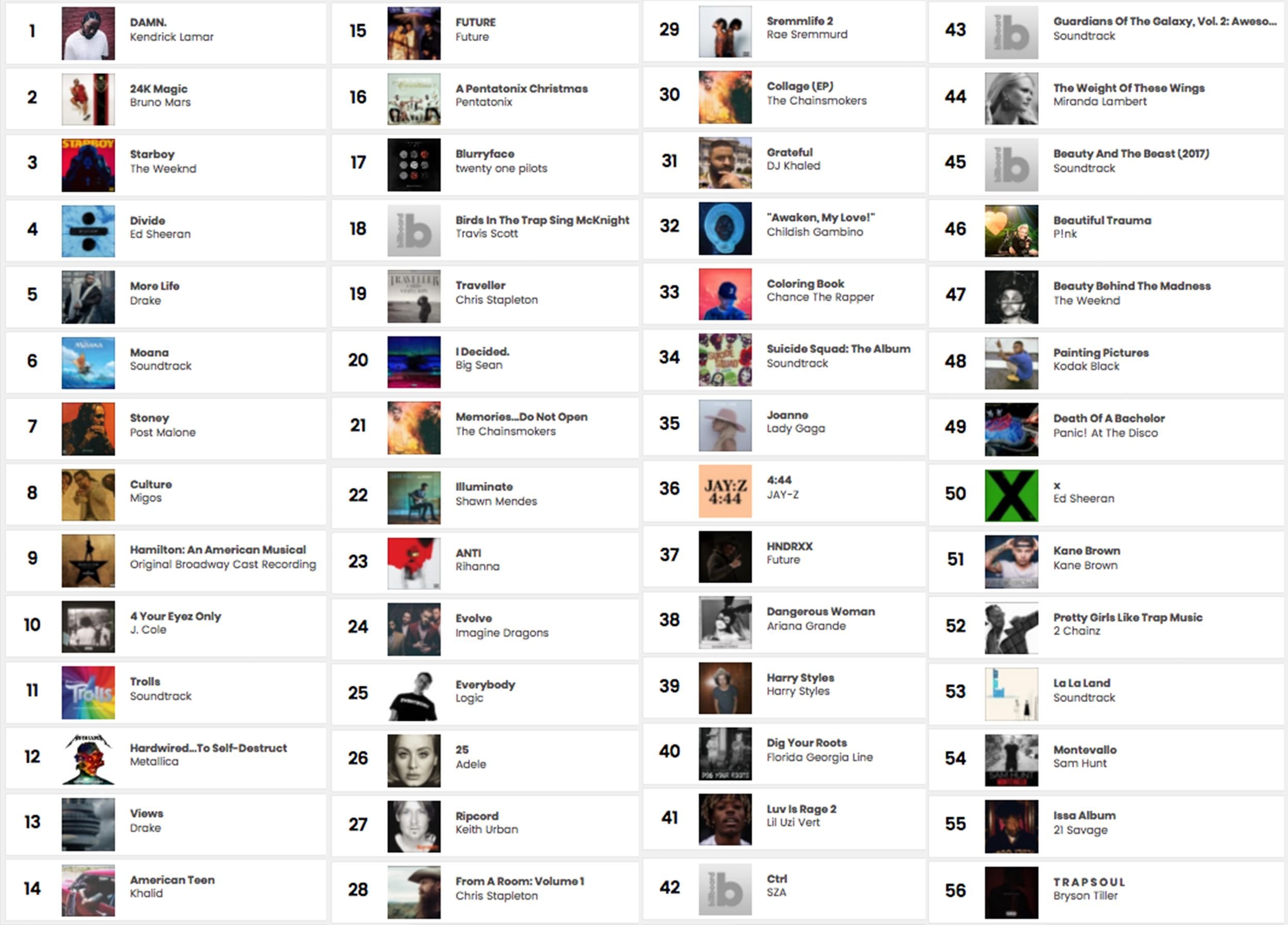
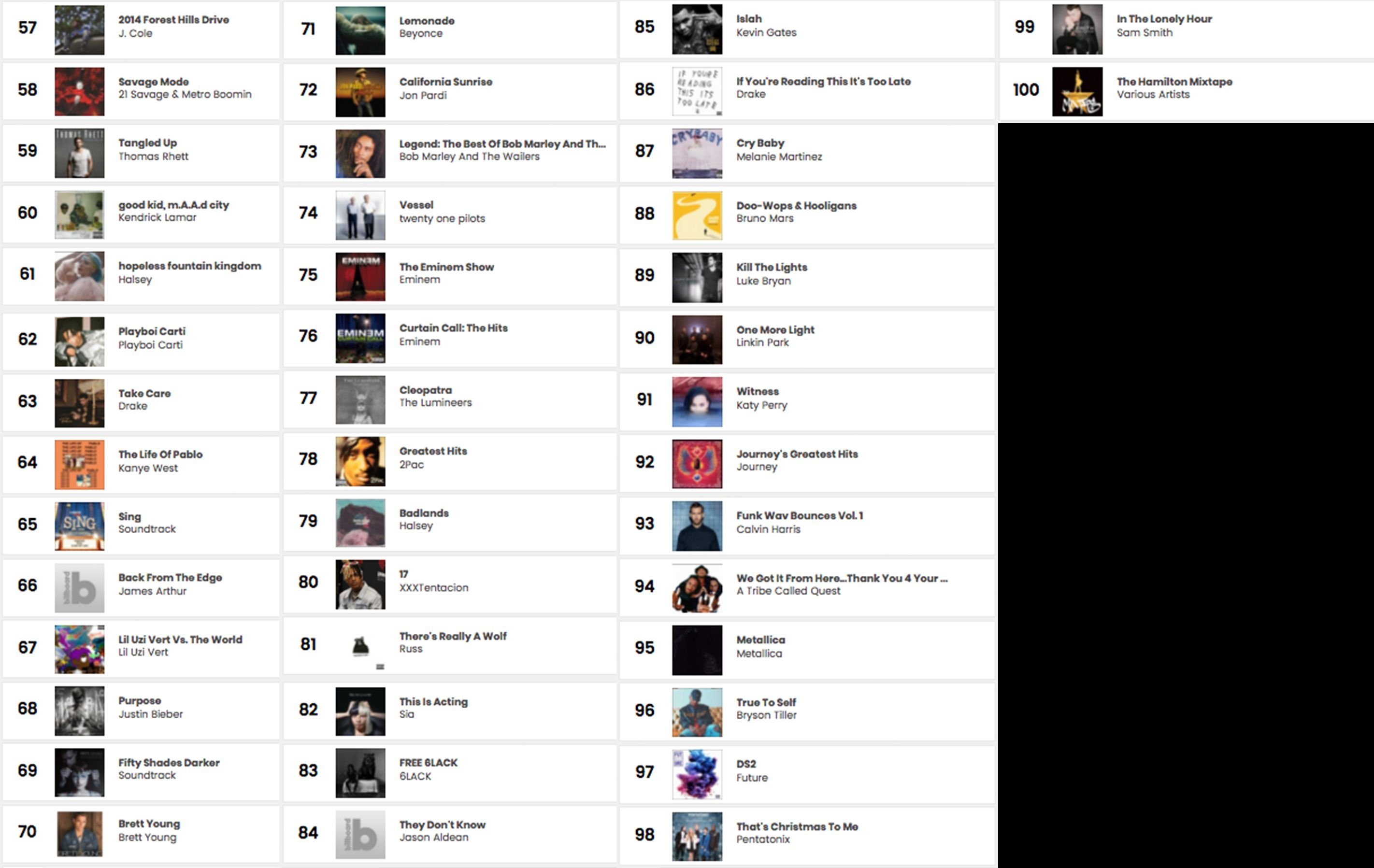
The Next Big Technology for Recording Studios
I think that wireless devices and cable free systems. There will be many of these setups soon. The Bluetooth functionality on the roli seaboard rise 49 is also another huge step toward a cable free music world.

The 59th Annual Grammy Awards Highlights
Adele - Winner for Album of the Year, Song of the Year and Record of the Year, Best Solo Pop Performance, Best Pop Vocal Album

Almost expected, though many hoped Beyonce would have won. I respect Adele greatly. At the awards she sang Fastlove by George Michael. She messed up and stopped the performance to correct herself and do it better. It was a bold move at such a huge show, just shows you how much she respects other artists and to get the performance right for herself and everyone else.
Chance the Rapper - Winner for Best New Artist, Best Rap Album, Best Rap Performance (nominated for 4 other things as well)
Needless to say, he was more than a little excited. From releasing his first mixtape, and then 5 years later accepting a Grammy award is an enormous feat. Chance is always taking chances. He takes shots at labels in his songs, makes songs for freedom, and has a philanthropic viewpoint about how music can change lives. He is right, and the awards are more than well deserved.

The Billboard Music Awards
Drake - Winner for Artist of the Year, Top Male Artist, Top Billboard 200 Artist, Top Hot 100 Artist, Top Song Sales Artist, Top Streaming Songs Artist, Top Rap Artist, and many more... seriously.

On top of being named Artist of the Year by Billboard Music Awards, seriously he took home 13 awards from this show alone. He became the biggest single winner at Billboard Awards ever, passing Adele who had 12 titles winning in the past.
The Chainsmokers - Top Hot 100 Song "Closer", Top Dance Song, Top Dance Artist, and Top Collaboration

The 2017 MTV Video Music Awards
Kendrick Lamar - Video of the Year for "Humble", and 5 other awards related to Humble

Ed Sheeran - Artist of The Year
This man I respect highly. Ed Sheeran is one of the most brilliant songriters of our time. His lyrical writing is just so smooth, lines blend together, and just sit in the mouth differently than anyone elses lines.

Khalid - Winner Best New Artist (Artist to Watch Award)
The 19-year-old Khalid's amazing debut album "American Teen" brought him to early fame. Well deserved, and brilliant collaborations for him to move to the top!

The Future of Streaming

I would like to see an advancement of streaming payouts to authors. Right now, 1 million streams will earn an artist an average of $16.89. The amount of work, advertising, PR, etc that it takes to get 1 million streams is ridiculous. So as a music creator, I would like to see a greater payout to this, which would, in turn, mean higher costs for users (even like myself) to be using Spotify, Pandora, Itunes Music, etc. But this would pay the people who are creating the content we all are consuming. This would have to be so much higher to make people even interested. In fact, music streaming was more popular than movie or TV streaming this year. There's an issue with those as well which we can get into another time. Basically, there's a content battle for TV and movie services that are more extreme than with music at the moment. Most large streaming services are losing enormous amounts of money.

In the past musicians would price their singles for sale at $0.99 per track. If this were done each user had access to the songs that they bought, but in the streaming format - this could solve the problem. Each person would have a key to access each song they are interested in, to stream as much as they want. If an artist is receiving literally one-thousandth of a penny per stream, this doesn't seem to equate the work, recording, writing, engineering, the hiring of other artists, PR, advertising. Lastly, even streaming services that are getting some money from these membership fees are always losing money. It's a win-win if we switched to the old system ($0.99 per track) but kept the new delivery platform (streaming from anywhere, anytime).
The Blockchain Technology Integration into the Music Industry
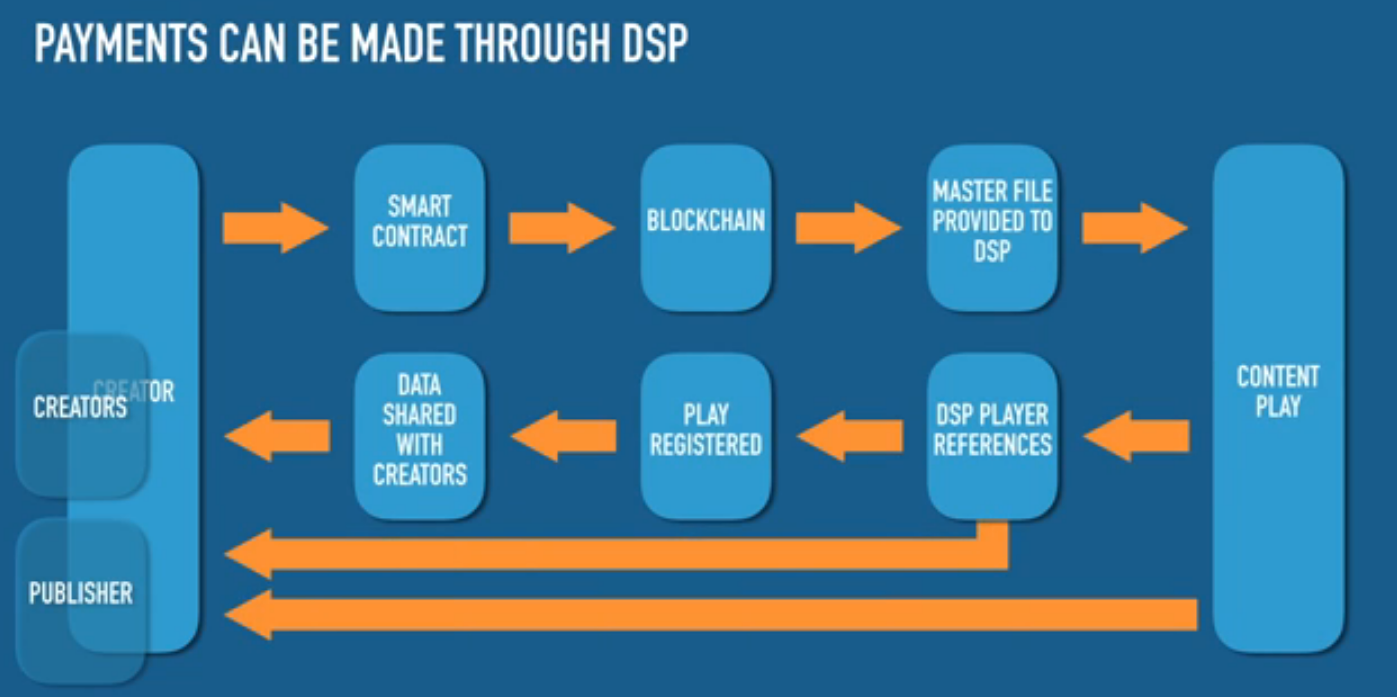
Musicians suffer from poorly constructed or non-existant metadata. I think something may come out soon that is directly inspired by the blockchain. Since people are constantly changing bands, getting different engineers, adding collaborations, swapping record labels, licenses change hands, re-recorded tracks, remixes, album remastering, or literally thousands of other potential reasons that data would be useful to keep track of. Why isn't there a system like the blockchain that can imprint this information both for the world to access, but so that it never gets lost?
The blockchain is basically built perfectly for the music industry to adopt. This is because the Music Industry is essentially already decentralized. It works particularly well to solve problems that are otherwise very difficult to solve. Maybe it can untie the knots of data that the Music Industry so desperately needs? More on this to come, but I hope I got some of us thinking!

It's never been a better time to be able to self promote to literally billions of people by pressing your finger against the glass screen of a miniature computer that you put into your pocket. We've come so far in the music world, and there's so much to come. This year in 2018 will be HUGE and I can't wait for the developments.
Steemians, in anticipation for the new year I want to thank everyone for the support and ideas being shared since I've been on Steemit, and even before. Into the new year I hope we find ourselves having more peace, healthy collaborations, and success in our lives and businesses. Onward and upward, together we shall go!

